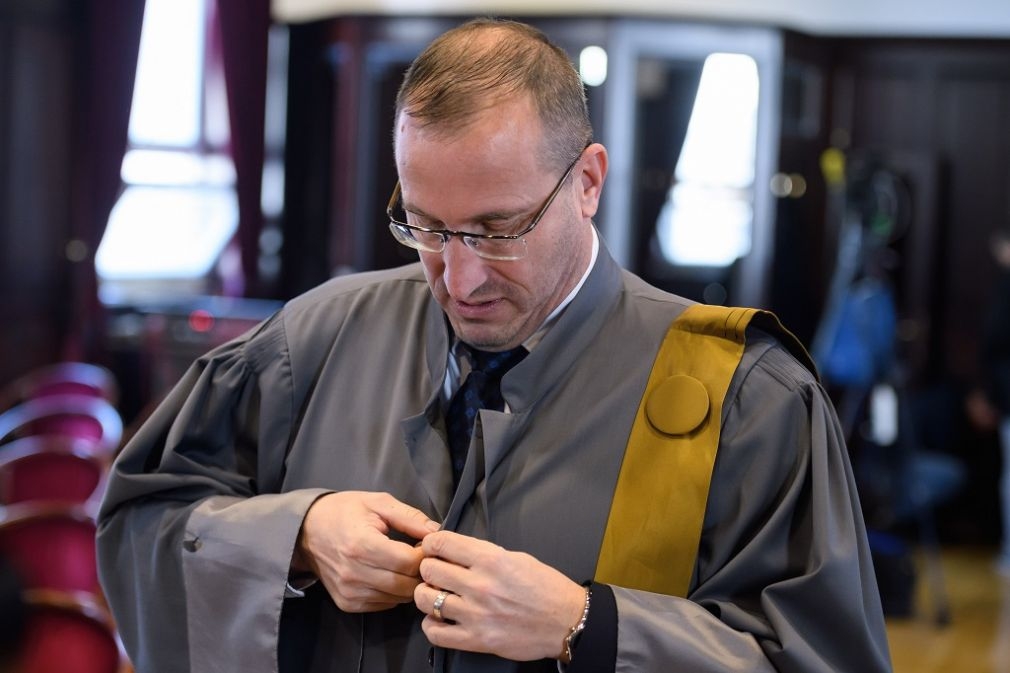By: Sara Bertoncelj / Nova24tv
“The conduct of the General State Prosecutor Drago Šketa and the writing of letters to Brussels and the incitement to take action against one’s own country is an acute matter. We should discuss this topic today and not some bizarre things,” said MP Dejan Kaloh at today’s Justice Committee, where they decided on the opposition amendment to the Public Prosecutor’s Office Act. So, they did not talk about the efficiency of the prosecutor’s office, nor about the leak of data – the last example was a former employee of the Specialised State Prosecutor’s Office, who shared information with the Kawash clan. To conclude – they did not talk about any important things at the committee meeting, they only discussed a bizarre amendment – this is how one of the proponents, Tina Heferle, from the LMŠ parliamentary group, described the amendments to the law.
Eight members of the committee voted against the proposed amendment, including one of the nominators, Tina Heferle from the LMŠ parliamentary group, so no one was in favour. Heferle admitted at the outset that the proposed amendment to the Public Prosecutor’s Office Act was only a manoeuvre by which the LMŠ tried to slow down the adoption of government changes regarding the appointment of European delegated prosecutors. According to the LMŠ, these are harmful and could lead to an even more serious consequence, the politicisation of the institute of European delegated prosecutors. “This was our last tool to protect, at least for now, the institution of a European delegated prosecutor, which must be independent of political will,” she said. In LMŠ, they wrote minimal changes to the law, which are of a purely technical nature and, according to Heferle, are substantively unnecessary and unfounded. “I have no problem admitting that the amendment is bizarre,” she said. Thus, they were only wasting time at the committee meeting.
Some members of the committee emphasised that it would be more fruitful to address the issue of the efficiency of the judiciary in Slovenia. Dušan Verbič from the parliamentary group Konkretno recalled, for example, the Balkan Warrior, which in his opinion is a disgrace to the Slovenian prosecutor’s office. He also pointed out that in Slovenia many cases of economic crime become obsolete in court. The National Assembly is not a place to discuss bizarre things, so the SDS parliamentary group did not support the proposed amendment to the law, said SDS MP Dejan Kaloh, who also pointed out that the conduct of Prosecutor General Drago Šketa and writing letters to Brussels and inciting action against one’s own country is an acute matter. Unfortunately, a session on this topic has not yet been convened. “I am really worried that LMŠ is always on the verge of disputing the legality of processing when it comes to personal data records,” he reminded of the Interior Minister Boštjan Poklukar, who received data from OKC, although he was not entitled to it.
Šketa’s coup d’état
Let’s remember, in early February, in response to a parliamentary question from Zmago Jelinčič, Prime Minister Janez Janša said that Šketa had sent a letter to Brussels requesting the conditionality or freezing of European funds. The Prime Minister believed this act was bordering on a coup d’état. Šketa firmly rejected Janša’s accusations, but there were reactions from the EU confirming that the suspension was mentioned. The Prime Minister also accused Šketa of misleading and demanding the freezing of European funds for Slovenia at a meeting in Luxembourg, even though he knew that the proposed amendment to the SNS Criminal Code would not be adopted anyway. At the meeting of prosecutors in Luxembourg, Šketa informed Chief European Prosecutor Laura Kövesi about changes to the Penal Code – even though the National Assembly withdrew these amendments to the Penal Code from the agenda.
In response to Jelinčič’s question, Janša also emphasised that the demands for the freezing of European funds were rejected. He said that the matter had already gone over the edge when the SD president and MEP Tanja Fajon spoke about the conditionality of funds, but it was still part of the political discourse at the time. The Prime Minister also pointed out the fact that Slovenian European Commissioner Janez Lenarčič also tried to prevent his own country from obtaining European funds.
Šketa’s visit to Moscow was also criticised, especially because Igor Krasnov has been on the list of people who are subject to restrictive measures, such as the freezing of funds and economic resources in the countries of the European Union, for almost a year now after the EU Council’s decision due to serious violations and human rights abuses. In Slovakia, too, prosecutor Maroš Žilinka’s visit to Moscow sparked a scandal, followed by demands for his resignation.
The reasons why Šketa should not become the new general state prosecutor were published by the journalist Boris Cipot in the Reporter years ago. Extensive reasons were provided to him in an extensive documentation by the 2015 Civil Rights Committee, which shows that Šketa had on his conscience several violations of fundamental human freedoms regarding the prosecution of Franc Kangler. Nevertheless, in early 2012, Cerar’s Minister of Justice Aleš Zalar forwarded to the MPs of the National Assembly a proposal from the State Prosecutor’s Council on the appointment of Šketa for GDT, which was not a particular risk given the ratio of votes in parliament. Šketa thus replaced the infamous Zvonko Fišer, who celebrated in a court farce called Patria, and Šketa was the generator of criminal prosecution measures against Kangler, Cipot reminded the Prava.si media once again.
